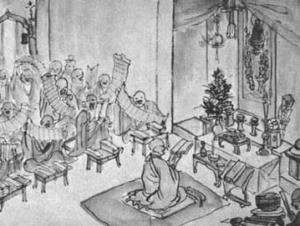I just saw a meme on Facebook that reads “Tradition: peer pressure from the dead.” I smiled.
And then it made think a moment.
And from that another frame: “Tradition: best practices from our ancestors.”
Of course tradition, as valuable as it can be, must be balanced. I’m taken with a reframing of Richard Hooker’s analysis of the genius of Anglican Christianity. He suggests for his tradition a three-legged stool consisting of Scripture, Tradition, and Reason.
I feel there is something transferable in this. A near universal three-legged stool for any viable spiritual path. We can start with any of them, they’re all intertwined.
For me it speaks profoundly to how best engage Zen. The Three-Legged stool of the Zen way.
So, as tradition is on my mind.
Tradition: The received wisdom. For me it is Buddhism. And I believe Buddhism’s received wisdom is best summarized with the Three Marks of Existence: First, everything made of parts will come apart. And, everything is made of parts. The universe and every blessed thing in it arises, exists, and comes apart in a play of causes and conditions. Second, this constantly moving universe manifests as a tension, a vibration, if you will. And, this is experienced by human beings as a sense of dis-ease, unsatisfactoriness, anxiousness rising for many to anguish. Third, no thing is a thing. Nothing has a permanent essence. It is all the play of cause and effect. And, me, I join with those who ad in a fourth: There is the possibility of setting the heart at rest, a peace that passes all understanding.
Scripture: As a Zen Buddhist, fitting into the larger Mahayana Dharma family, the vast collection of sacred texts are mine. However, as a Zen person, the texts to which I find myself called most accountable to are the Prajanaparamita cycle, the great koan anthologies, and the received teachings of the masters of my tradition. I believe I have some need to attend to the great texts the Flower Ornament and the Lotus “Sutras, as well. And, again, as part of the Zen tradition, I have some accountability to the classics of the Daoist and Confucian traditions.
Reason: A rich, rich word, with several necessary meanings. In one way I think of the Chinese character “De” as used in the Dao De Jing. In some early translations the character is rendered as “reason.” But it also is rendered as “virtue,” “integrity,” and “morality.” Add in our Western use of reason as “the power of logic,” and I believe we begin to see what reason can be. It is both knowledge and integrated presence. In our experience it is now one, now the other. As a Zen person it points to the deeper nuances of the practices of presence gifted in our tradition: just sitting and koan introspection. Each bring our mind toward intimacy and clarity.
All three need each other. None works all by itself.
But, taken together.
A way of life that is worth our lives.













